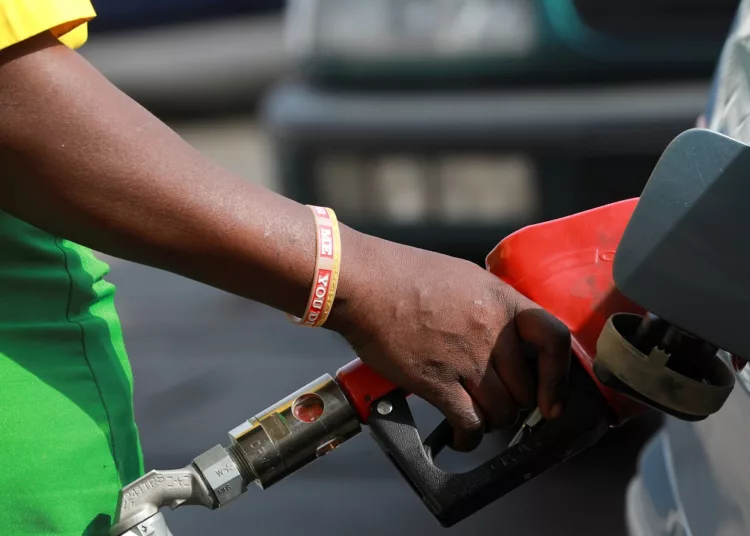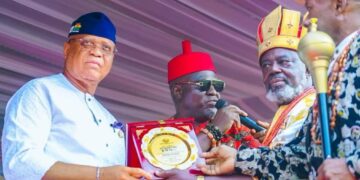The presidency has clarified that the federal government will not intervene in the ongoing fuel price controversy between Dangote Refinery and the Nigerian National Petroleum Company Limited (NNPCL).
President Bola Tinubu’s special adviser on information and strategy, Bayo Onanuga, disclosed this to State House correspondents on Wednesday at the Presidential Villa in Abuja.
Onanuga said both entities operate as independent companies in a deregulated market and noted that under the Petroleum Industry Act, NNPCL operates autonomously despite being owned by federal, state, and local governments.
He added that the free market would ultimately benefit consumers, as other private marketers could import fuel and sell at competitive prices if they find NNPC or Dangote’s prices too high.
He said, “The PMS field, the PMS regime, has been deregulated. Dangote is a private company. NNPC, don’t forget, is a limited liability company. Whatever controversy both of them are having is their problem. They are operating according to the terms of the Petroleum Industry Act.
“NNPCL is on its own; even though the federal government owns it, the state and local councils own it, it operates as a limited liability company.
“You can see what the private marketers have said. If they find the NNPC or Dangote price too high, they will resort to importing fuel. It is the consumer who benefits if a price war starts; if NNPC fuel is too expensive, the private marketers can bring in their own fuel and sell it at what they consider a reasonable and profitable price.
“So my answer is that, as far as this is concerned, the government is not dabbling in this controversy. NNPCL is running as a private company and operating independently. NNPCL is a limited liability company and has the right to set its own prices.”
Onanuga disclosed that the Tinubu administration was focusing on promoting alternative energy solutions rather than intervening in the price dispute.
According to him, the government’s plan is to encourage Compressed Natural Gas (CNG) as a cheaper alternative to petrol, noting that the price difference is significant, with CNG costing about N230 per litre compared to PMS, which is about N850 per litre.
The government aims to have about a million vehicles running on CNG and plans to subsidise the conversion costs for private vehicle owners, he said.
“So that’s what you see, as a counter to that, is that the government has a programme – which someone mentioned earlier – about CNG, and the government wants to ensure that Nigerians have a choice: if you don’t want to use PMS, you can use CNG, and you can see what’s going on in many of our cities, like Lagos, Ibadan, Benin, and some others where transporters are already embracing CNG.
“The whole idea is that the gap between CNG and PMS is very, very wide. If you want to buy a litre of petrol, if they sell it at N850, the equivalent of CNG will be about N230.
“Some transporters are already converting their vehicles to CNG, and the government plans to ensure that about a million of those vehicles run on CNG. The idea is that transportation costs will decrease if they run on CNG.”
Onanuga further stated that the Tinubu administration was encouraging states to develop urban transportation systems to reduce overall transportation costs for the citizens.
“In addition, the government encourage many of our states to invest in urban transportation to help reduce transportation costs in many of our cities. As of now, the entire country has only Lagos State with an urban transport system.
“Cities like Ibadan, Kaduna, and Kano don’t have it. But this government plans to encourage all of them to start urban transportation.
“Any modern city should have an urban transport system, whether it be a bus system or similar. This is the government’s plan to ensure that we shift our attention from just one consumer payment; there must be alternative energy that we can also use, which is cheaper, and CNG has proven to be that.
“The government also plans to ensure that even private car owners can convert to CNG at a reduced cost. It is almost free for transporters, but for private vehicle owners, the government has a plan to subsidise the cost of converting vehicles from petrol to CNG.”
FG Urged to Increase Stake in Dangote Refinery to 45%
The Petroleum and Natural Gas Senior Staff Association of Nigeria (PENGASSAN) has called on the federal government to increase its stake in Dangote Refinery to 45 per cent from the current seven per cent.
PENGASSAN President Festus Osifo made the call on Tuesday while presenting a communiqué and recommendations from the 3rd edition of the PENGASSAN Energy and Labour Summit in Lagos to newsmen.
PENGASSAN stated that this move would foster product availability to meet local demand and ensure energy assurance and security for citizens.
The union suggested that the nation’s refineries be modelled after the Nigerian Liquefied Natural Gas (NLNG) model, which has been successful.
“Ramping up efforts to make the nation’s four refineries operational; once they are up and running, the government should divest majority shareholdings and retain at most 49 percent of the shares in the four refineries. Core investors would be brought in to take the 51 percent, as applicable in NLNG.”
Bemoaning the dilapidated inter-land petroleum depots across the country’s six geopolitical zones, Osifo stressed the need for the government to collaborate with the private sector to refurbish the depots and ensure the smooth distribution of petroleum products, enhancing the national strategic reserve.
PENGASSAN also called for the expansion of pipelines capable of delivering refined petroleum products nationwide, which would alleviate the pressure on roads from trucks carrying the products.
The group recommended digital interventions to combat crude oil theft, re-engineer security architecture, and ensure ease of doing business by reducing bureaucratic complexities that render gas investment unattractive to investors, among other measures.
Osifo asserted that those caught in crude oil theft should face severe penalties from competent courts to deter others.
He noted that participants were concerned that a section of the Act had not been implemented three years after the passage of the Petroleum Industry Act (PIA), which stipulates that 3 percent of oil companies’ operational revenue should be allocated to the host community fund.
He urged the government to create a business-friendly environment by providing incentives for more investors to tap into the nation’s abundant gas resources.
In the upstream sector, he suggested amending the PIA to include a divestment framework, noting that previous divestments had not yielded results as the companies lacked he financial capacity to sustain and expand the divested oil wells.
The group also encouraged the Nigerian energy sector to leverage advancements in artificial intelligence (AI) to improve productivity and sustainability while tackling oil theft and smuggling.





